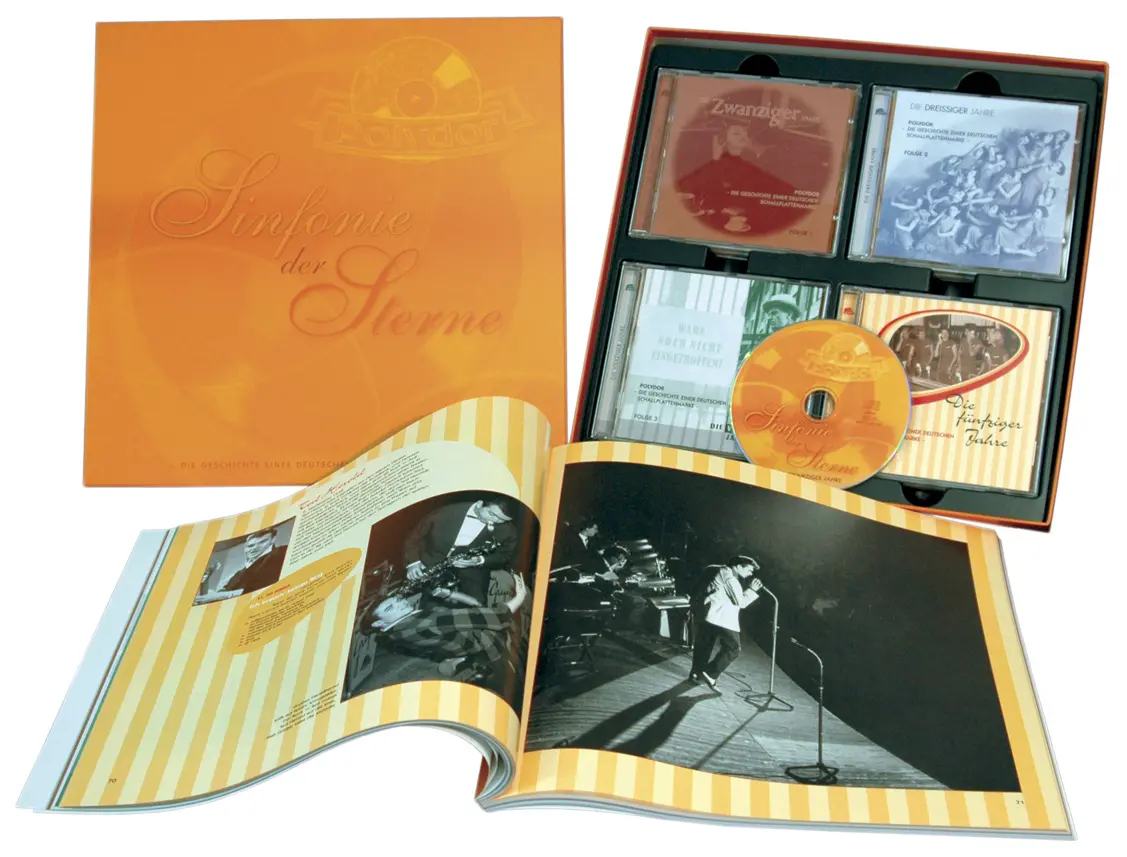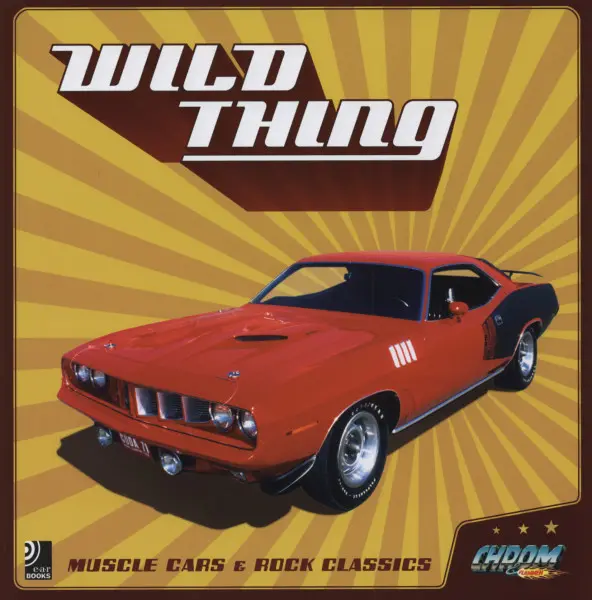Willi Stech Radio Klassiker - Willi Stech und das Tanzorchester des Deutschlandsenders 1942-43

- catalog number:CDJUBE1600
- weight in Kg 0.1
Willi Stech: Radio Klassiker - Willi Stech und das Tanzorchester des Deutschlandsenders 1942-43
Radio classic
Willi Stech and the Tanzorchester des Deutschlandsenders 194243
In the light of the music collected on this CD, a piece of radio history comes alive again with a history that has not yet been completely unraveled and unraveled due to its complex structure. German radio at the beginning of the 1940s, with its various empires and foreign broadcasters, had been completely reorganized at the beginning of the Second World War. Entertainment and propaganda should keep front as well as home in good spirits and distract from actual warfare. New orchestral orchestras were founded "orchestras in which almost all available top musicians of classical music and entertainment met.
Willi Stech, born on November 29, 1905 in Krefeld, was already a founding member of the legendary "Golden Seven", which was forcibly dissolved in 1939 by Minister of Propaganda Joseph Goebbels. The founding of the great Tanzorchester des Deutschlandsenders ran almost simultaneously with the formation of the Deutsches Tanz und Unterhaltungsorchester by the composers Franz Grothe and Georg Haentzschel, who also participated in the "Golden Seven" from the beginning.
All too often it happened that individual musicians and soloists oscillated back and forth between the two orchestras. Since all activities in this regard took place in the Berlin House of Broadcasting in Masurenallee, this fact is not surprising. While the "regional" Reichsender Berlin broadcast on medium wave, the "supraregional" Germany broadcaster could be heard on "Langer Welle" throughout Germany. Both the DTU under Georg Haentzschel and Franz Grothe as well as the dance orchestra of the Deutschlandsender consisted in their core of at least 12 violins, 4 violas, 4 saxophones, 3 trumpets and trombones, piano, bass and percussion and could be further increased if necessary. In the winter of the war year 1941, the dance band of the German channel under Willi Stech went on the air for the first time, a few weeks after the DTU made its official broadcast debut.
The orchestra was almost constantly in action since the end of 1941. It participated in television broadcasts and colorful afternoons. Live performances on the radio were as much a part of the day-to-day business as the pre-production of music titles as "Konserve", which was then used arbitrarily. Was mostly recorded in the "Blue Hall" of Berlin ...
Dr. Jens-Uwe Völmecke
google translation
Article properties:Willi Stech: Radio Klassiker - Willi Stech und das Tanzorchester des Deutschlandsenders 1942-43
Interpret: Willi Stech
Album titlle: Radio Klassiker - Willi Stech und das Tanzorchester des Deutschlandsenders 1942-43
Genre Schlager und Volksmusik
Label JUBE
- Preiscode JUBE
Artikelart CD
EAN: 4040741016003
- weight in Kg 0.1
| Stech, Willi - Radio Klassiker - Willi Stech und das Tanzorchester des Deutschlandsenders 1942-43 CD 1 | ||||
|---|---|---|---|---|
| 01 | Heisse Tage | Willi Stech | ||
| 02 | Hallo, Susanne | Willi Stech | ||
| 03 | Am Waibuwamba | Willi Stech | ||
| 04 | Übermut | Willi Stech | ||
| 05 | Sleepy Time Down South | Willi Stech | ||
| 06 | Das Leben beginnt erst, wenn man verliebt ist | Willi Stech | ||
| 07 | Foxtrott | Willi Stech | ||
| 08 | Where Or When | Willi Stech | ||
| 09 | I'm A Dreamer | Willi Stech | ||
| 10 | rugby | Willi Stech | ||
| 11 | On The Alamo | Willi Stech | ||
| 12 | City-Lights (Rembrandtplein) | Willi Stech | ||
| 13 | Sand-Dünen | Willi Stech | ||
| 14 | Verliebte Melodie | Willi Stech | ||
| 15 | Ararat | Willi Stech | ||
| 16 | Lover Come Back To Me | Willi Stech | ||
| 17 | Maria La-O | Willi Stech | ||
| 18 | Brigitte | Willi Stech | ||
| 19 | Star Dust | Willi Stech | ||
| 20 | Alles wird gut | Willi Stech | ||
| 21 | Du musst mich lieben wie ich bin | Willi Stech | ||
Willi Stech
* 29. Mai 1905 - 28. April 1979
 Willi Stech * 29. Mai 1905 - 28. April 1979 Wie Kurt Hohenberger ist auch der Pianist und Arrangeur Willi Stech 1934 ein Gründungsmitglied der "Goldenen Sieben". Er ist in den frühen 40er Jahren Chef des großen Tanz- und Unterhaltungsorchester am Berliner Deutschlandsender und wird 1943 Nachfolger von Franz Grothe und Georg Haentzschel als einer von mehreren Leitern des Deutschen Tanz- und Unterhaltungsorchesters (DTUO). "Wenn wir wieder tanzen" ist eine Aufnahme aus dem Jahr 1943, die auf dem Etikett Siemens-Polydor herauskommt. - Nach dem Krieg bleibt Willi Stech für zahlreiche Rundfunkstationen als Orchesterleiter tätig.
Willi Stech * 29. Mai 1905 - 28. April 1979 Wie Kurt Hohenberger ist auch der Pianist und Arrangeur Willi Stech 1934 ein Gründungsmitglied der "Goldenen Sieben". Er ist in den frühen 40er Jahren Chef des großen Tanz- und Unterhaltungsorchester am Berliner Deutschlandsender und wird 1943 Nachfolger von Franz Grothe und Georg Haentzschel als einer von mehreren Leitern des Deutschen Tanz- und Unterhaltungsorchesters (DTUO). "Wenn wir wieder tanzen" ist eine Aufnahme aus dem Jahr 1943, die auf dem Etikett Siemens-Polydor herauskommt. - Nach dem Krieg bleibt Willi Stech für zahlreiche Rundfunkstationen als Orchesterleiter tätig.
Various Artists -
Sinfonie der Sterne Sinfonie der Sterne,
1920-90er (8-CD & 1-DVD mit 192-seitigem Buch)
Read more at: https://www.bear-family.de/various-sinfonie-der-sterne-sinfonie-der-sterne-20-90er-8-cd-und-1-dvd-mit-192-seitigem-buch.html
Copyright © Bear Family Records

This article is deleted and can no longer be ordered!

This article is deleted and can no longer be ordered!

This article is deleted and can no longer be ordered!

This article is deleted and can no longer be ordered!

This article is deleted and can no longer be ordered!

Ready to ship today, delivery time** appr. 1-3 workdays

Ready to ship today, delivery time** appr. 1-3 workdays

Ready to ship today, delivery time** appr. 1-3 workdays

Ready to ship today, delivery time** appr. 1-3 workdays

Ready to ship today, delivery time** appr. 1-3 workdays







